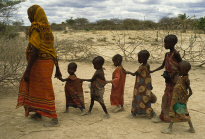
Typical street scene in Santa Ana, El Salvador. (Photo: iStock)
IMF Survey: IMF to Host Seminar on Impact of Commodity Price Volatility
September 13, 2011
- Leaders from development world to gather at major IMF conference
- Discussions include mitigating impact of commodity price volatility
- Participants to debate how to achieve inclusive growth
The IMF will host a major conference on September 21 to discuss the challenges posed by commodity price volatility and growth policies that benefit the population in low-income countries.

A Somali family en route to a feeding station. The crisis in the Horn of Africa will be debated at the IMF conference (photo: Andrew Holbrooke/Corbis)
IMF CONFERENCE
The one-day gathering—part of the IMF-World Bank Annual Meetings in Washington DC—will be attended by leading names from the world of development, including two Nobel Prize winners; the head of the United Nations World Food Program; finance ministers and central bank governors from around the world; and top economists including Jeffrey Sachs, Paul Collier, Jeffrey Frankel, and Abhijit Banerjee.
The IMF’s Managing Director, Christine Lagarde, will open the conference which is expected to be attended by more than two hundred attendees.
Challenges facing low-income countries
Some low-income countries have benefited from higher commodity export prices in recent years, but the conference comes as many other, commodity-importing countries are facing difficulties because of rapidly rising food and fuel prices.
Fragile states, including Somalia, are currently suffering the most from high commodity prices and it is estimated that more than 12 million people in the Horn of Africa are facing famine as the region confronts the worst drought in over half a century.
The conference will hear from Josette Sheeran, the head of the World Food Program, about her recent visit to Somalia and Kenya to assess the impact of the famine in the region.
Most low-income countries have enjoyed a strong economic recovery following the global financial crisis. Many of these countries were able to use available fiscal resources which they had accumulated thanks to more prudent policies, in order to mitigate the consequences of the global slump. But with a deteriorating economic situation in many parts of the world, they remain highly vulnerable to the risk of a double-dip recession.
New policy options
The seminar will explore new options for low-income countries to respond to commodity price volatility, including potential roles for monetary policy and the exchange rate as weapons against commodity price increases.
Hugh Bredenkamp, of the IMF’s African Department, will make a presentation—“Higher Commodity Prices in an Uncertain Global Environment”—in which he will highlight vulnerabilities and discuss policy options.
The keynote addresses will be given by the Nobel laureate, Joseph Stiglitz, who will speak on “Globalization and Income Distribution,” after which Jeffrey Sachs of Columbia University will consider the impact of climate change on food security in the world’s poorest countries.
Traditionally, higher growth in low-income countries has often been seen as the only way out of poverty, but in many cases, higher growth episodes in these countries have not necessarily translated into to lower levels of poverty. In some cases, they have even resulted in greater poverty.
Considering inclusive growth
The conference will consider how to achieve inclusive growth in low-income countries. This discussion is likely to discuss options such as extending access to finance for vulnerable segments of the population, and preventing rent-seeking behavior which deprives citizens of public resources.
Expected participants to that debate include IMF Deputy Managing Director Min Zhu; Nancy Birdsall of the Center for Global Development; Ray Offenheiser, president of Oxfam America; the Nigerian finance minister, Ngozi Okonjo-Iweala; Tunisian central bank governor, Mustapha Nabli; and the Nobel laureate George Akerlof. The debate will be moderated by Al Jazeera’s Yvonne Ndege.
Other topics for discussion include the macro-policy options for low-income countries. Eswar Prasad of Cornell University will speak alongside Paul Collier of Oxford University who will be giving a presentation on “Saving and Investment Decisions in Natural Resource Rich low-income countries.”
The chief economist of the Asian Development Bank, Chanyong Rhee, will also be speaking about food price inflation, poverty, and inclusive growth in Asia.
The high-level seminar will end with a cocktail reception hosted by IMF Deputy Managing Director, Nemat Shafik, who will give brief remarks on the Fund's capacity building efforts.


